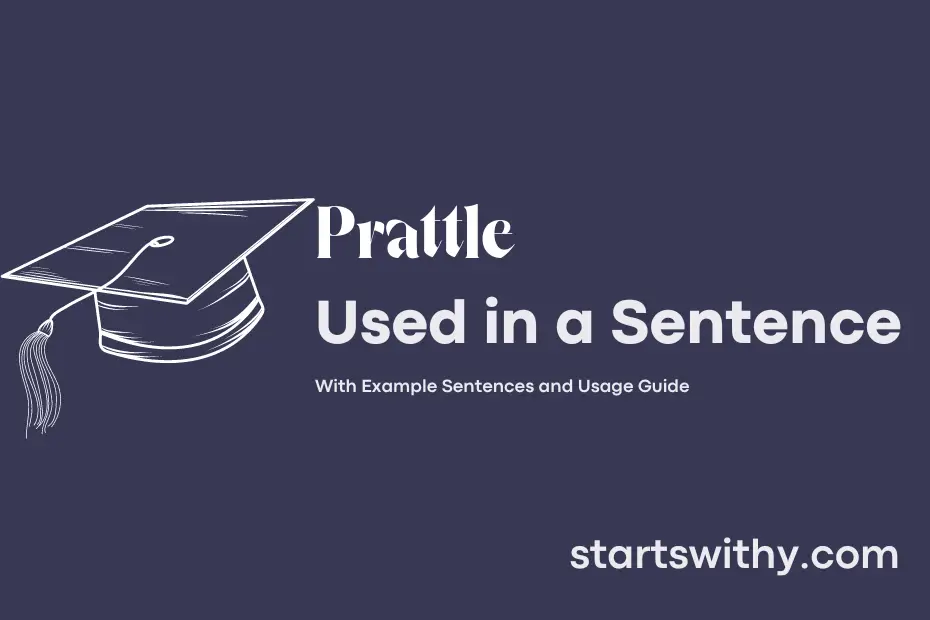Have you ever found yourself in a conversation where someone just wouldn’t stop talking and seemed to be going on and on aimlessly? This long-winded chatter is what we often refer to as “prattle.” In essence, prattle refers to the idle or irrelevant talk that one engages in, usually in a tedious or monotonous manner.
Prattle can often be characterized by its lack of meaningful content or purpose, as it may consist of empty, trivial words or repetitions. It can be observed in various settings, from casual social gatherings to more formal discussions, where individuals may prattle on without realizing they are filling the air with unnecessary words.
7 Examples Of Prattle Used In a Sentence For Kids
- Prattle means talking on and on about nothing important.
- Sometimes friends prattle together about their favorite toys.
- You can prattle with your siblings while playing fun games.
- It’s okay to prattle when you are excited or happy.
- Grandma loves to listen to the prattle of her grandchildren.
- At school, the children prattle during lunchtime.
- Remember to listen when others prattle, it can be interesting.
14 Sentences with Prattle Examples
- Prattle during debates can distract the audience from the main points being discussed.
- It’s important to avoid prattling in class, as it disrupts the flow of the lecture.
- Group projects can become challenging when team members constantly prattle instead of focusing on the task at hand.
- Prattling on social media platforms can sometimes lead to misunderstandings and miscommunications.
- During group study sessions, it’s best to stay on track and avoid unnecessary prattle.
- Prattling during presentations can make the audience lose interest in the topic being discussed.
- It’s essential to stay focused and avoid prattling during exams to maximize your performance.
- Prattling in the library can disturb other students who are trying to concentrate on their studies.
- Prattle in the classroom can be disruptive and disrespectful to the professor and fellow students.
- It’s important to learn how to balance socializing with friends and avoiding excessive prattling during study hours.
- Prattling about irrelevant topics can waste valuable time during group study sessions.
- During seminars, it’s crucial to listen attentively to the speaker and avoid unnecessary prattle.
- Prattling during laboratory experiments can lead to mistakes and errors in data collection.
- It’s polite to wait for the appropriate moment to speak instead of prattling during guest lectures.
How To Use Prattle in Sentences?
Prattle is a unique and versatile tool that can add a touch of expressiveness to your writing.
To use Prattle in a sentence, simply insert the bolded word where you want to emphasize or highlight a particular point. For example, “She wouldn’t stop prattling on about her new job,” or “His constant prattle about politics became tiresome.”
Remember that Prattle should be used sparingly to avoid overwhelming your writing. It is best used when you want to draw attention to a specific word or phrase, add emphasis, or create a more dynamic tone in your sentence.
Additionally, you can play around with different sentence structures and word placements to see what works best for your writing style. Experimenting with Prattle can help you enhance your writing and make your sentences more engaging and impactful.
Overall, incorporating Prattle into your sentences can help you communicate your message more effectively and make your writing more interesting. So, don’t be afraid to try it out and see how it can elevate your writing!
Conclusion
In summary, it is evident from the examples provided that sentences with “prattle” often involve idle or meaningless chatter, often perceived as annoying or insincere. These sentences typically highlight gossip, trivial talk, or excessive talking without substance. In many contexts, “prattle” is used to describe speech that lacks depth or meaningful content, with a connotation of being frivolous or tiresome.
Overall, sentences with “prattle” serve to emphasize the emptiness or insignificance of certain conversations or dialogue. They underline the importance of meaningful communication and the impact of excessive or empty talk on interpersonal interactions. The use of “prattle” in sentences helps to convey a sense of triviality, shallowness, or gossipy nature, often urging individuals to engage in more meaningful discussions and avoid idle chatter.



